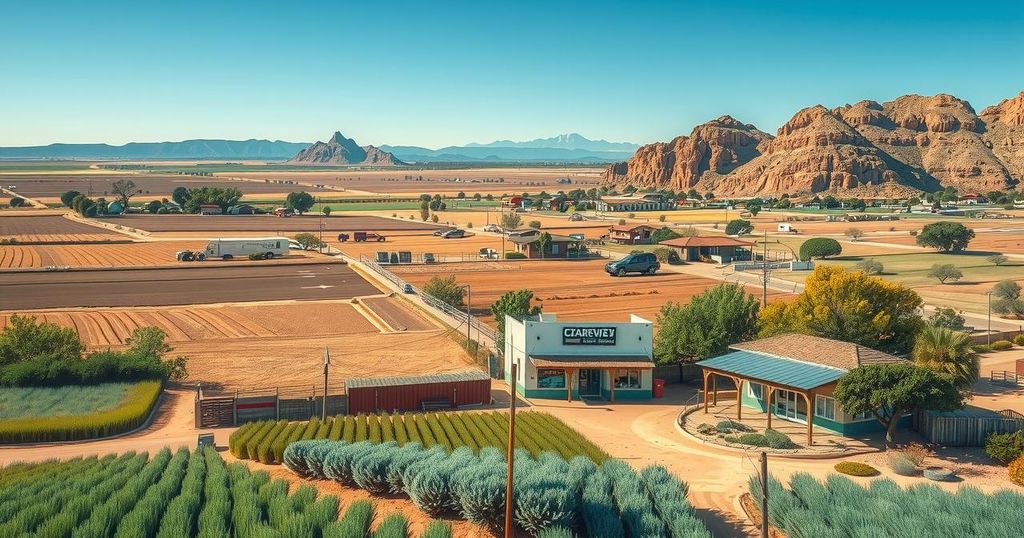Rio Grande Valley Voters Explain Shift in Support to GOP During Election

The 2024 election saw a political shift in the Rio Grande Valley, Texas, with voters moving from Democratic to Republican support. Judy Woodruff explores this change through the experiences of locals like Luz Ramos and Alexis Uscanga, highlighting the resulting divisions and tensions in the community. The future of political dialogue is uncertain as families navigate their differences amidst a polarized political climate.
The 2024 presidential election has resulted in surprising political shifts across the United States, notably in counties that traditionally lean Democratic. This includes the Rio Grande Valley in Texas, a heavily Hispanic area that unexpectedly shifted from blue to red. Judy Woodruff recently returned to the Valley to explore the reasons behind this change and how it has sparked political divides within communities, as part of her ongoing series, America at a Crossroads.
Among the local voters, Luz Ramos, a 28-year-old donut shop owner, shared her experiences with the escalating financial struggles in her community. “Just affording basic necessities was a big thing, milk, eggs, you know, tortillas. Like, that’s really a problem, not just for me, but for everybody here,” she noted. Faced with adversity, Ramos infused her shop with political flair, crafting donuts adorned with the faces of Trump and Harris. She found little interest in the latter, saying she only sold one Kamala donut, while her Trump-themed treats flew off the shelves.
Ramos’s newfound political engagement culminated in her casting her very first vote for Trump, reflecting a broader trend where the former president won all four counties in the Valley—a significant shift in a region that had been historically Democratic since the 1920s. However, expressing her support for Trump came at a steep personal cost. “This election was probably the most intense one we have had in so many years that a lot people, like, divided,” she said, referencing the backlash she faced, including hostile comments and threats.
The political landscape in the Valley has indeed shifted, revealing deeper fractures within communities. Alexis Uscanga, who grew up in a staunchly Democratic household, made the switch to Republican support after feeling frustrated by what he perceived as stagnation in his community. “Why are we having so many problems where people like myself, young people, wanted to leave the valley?” Uscanga questioned, pinpointing the Democrats for the challenges faced in the region.
Discontent with the current state of affairs resonates across party lines. Richard Cortez, the Democrat elected judge of Hidalgo County, reflects on the failures of both parties to connect with voters. He identified issues like the economy and immigration as pivotal points contributing to this discontent, remarking, “You have the power to provide leadership. He should be screaming and yelling at Congress… We lost control because we had so many people coming here seeking asylum.”
Conversely, the Howell family from Mercedes, Texas, is emblematic of the local bipartisan divide. The elder Howell, Jacob, voted for Trump while his son Skyler aligned with Harris. Their discussions amplify the tensions regarding Trump’s rhetoric and immigration policy. Skyler expressed concern over how immigrants are treated, noting that many simply seek a better life, while Jacob argued it should not have escalated to such issues due to open borders.
Despite their differing perspectives, the duo emphasizes the importance of maintaining familial bonds through political disagreements. Skyler articulates the perilous climate around addressing politics: “You won’t even see politics on anyone’s social media story anymore because they’re too afraid of either the backlash or the argument that’s going to happen because of it.” Jacob similarly underscores the pervasive divide, declaring, “It’s just divided not only this nation, but even the valley in general.”
As this political turbulence continues, the Howell family’s approach serves as a reminder that, even amidst division, mutual respect is vital. They aim for constructive dialogue rather than entrenched argumentation. For the PBS News Hour, Judy Woodruff reported from the Rio Grande Valley, shedding light on a community grappling with a new political reality wreaked by the recent election.
The political landscape of the Rio Grande Valley has shifted dramatically, with that change exposing deep rifts within its communities. Voters like Luz Ramos and Alexis Uscanga have turned to the Republican party in frustration with the Democratic leadership. Meanwhile, families are negotiating their differences amid a backdrop of heightened political tension. The future of dialogue in this region remains uncertain, with both divides and discussions taking center stage in the conversations of local residents.
Original Source: www.pbs.org








